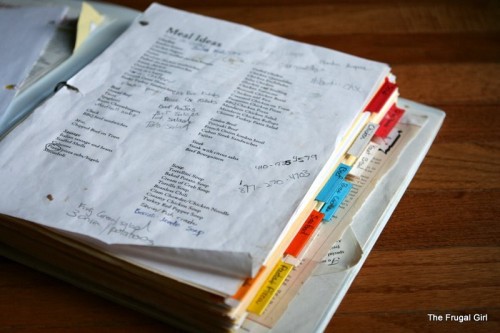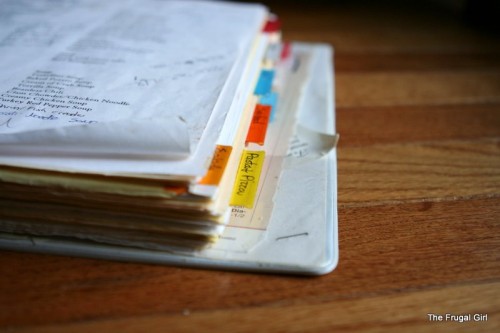Every Monday I answer several questions submitted by you, my readers! If you’d like to submit a question for a future edition of Monday Q&A, leave me a comment or send me an email (the frugal girl {at} gmail {dot} com) and put “Q&A” in the subject line. I look forward to hearing from you!
____________________________________________________________________________________________
This question was submitted by Bethany, one of my multitudinous cousins, and a faithful Frugal Girl reader. 😉
I like your recipes. They are easy to follow and require normal ingredients with great results (even for me!). How do you keep your recipes organized? I was thinking of starting a 3 ring binder.
A binder is exactly how I organize most of my recipes! My binder is in very sad shape right now though, and needs some serious reorganization/cleaning out.
Even in its less than pristine condition, my binder still serves me quite well. I use tab inserts to divide my recipes into categories that work for me like “Pasta and Pizza”, “Yeast Breads”, “Chicken”, and so on, to make it easy to find a recipe when I’m looking for it.
While most of my recipes are printed out on letter-size paper, some of them are on actual recipe cards, and those I keep in a typical recipe box. I also have a small cabinet devoted to storing my cookbooks and cooking magazines.
So, that’s my not-very-earthshaking recipe organization routine. I hope it’s helpful to you, though!
____________________________________________________________________________________________
This one was sent in by Sharon, who writes Unfinished Mom.
Okay, so I’ve been scouring the Wednesday Baking posts and now I’ve got a few questions.
For rising… define “warm water” and “a warm place”, please.
How warm is too warm for the water? I think when I tried baking a loaf of bread I killed the yeast with water too warm.“A warm place” … can it just sit on my counter? How warm should the house be? Is 75 too cool? 1Should I set the oven on lowest temp and put it in there?
I’m a real novice with not much luck when it comes to anything with yeast…. Help!
The temperature of the water will vary depending on the mixing method. If the recipe you’re using is the type where you dissolve the yeast in water before proceeding with the recipe, the water should be around 110 degrees. If, however, you’re using a recipe in which the yeast is mixed with flour and other dry ingredients before the liquid is added, the liquid should be 120-130 degrees.
About the temperature of your house…..bread dough will rise if you don’t put it in a warm place; it will just take longer to double in size. In the summertime, a “warm place” is just about anywhere in your house, unless you’re one of those people who keeps your AC really low. My AC is usually at 78 degrees, which is quite warm enough for bread dough to rise! 75 degrees should be warm enough, too, though, so if your bread isn’t rising at that temperature, something else is probably wrong (perhaps your yeast is not fresh, or your starting liquid was too hot).
In the wintertime, our heat is set at 65 degrees, which is a bit on the chilly side for bread dough. So, I often turn my oven on for a minute or so, turn it off, and then put my bread inside of the oven to rise. If the top of your fridge is clear, that’s another good place to let dough rise. Or, if you have a gas oven with a pilot light, you can let your bread rise inside of the oven, as the pilot light provides some warmth.
If you are a beginner yeast baker, you might want to try my no-knead English Muffin bread, easy French bread, or dinner roll recipes. These are all fairly simple to make and should turn out fairly well even if you aren’t particularly well-practiced at kneading and yeast baking. And if your first attempts don’t look quite like mine, don’t give up! Like many other skills, your breadmaking expertise will improve greatly with practice…I’ve been honing my bread-making skills for 17 years or so (my mom taught me how to make bread when I was in my early teens).
_____________________________________________________________________________________________
Jinger left this comment on my post about homeschooling a kindergartener. I’m guessing that she is not the first reader to wonder about this, so I thought I’d answer her comment here.
I am such an admirer of you in so many ways. I was a teacher for over 21 years and your methods are so sound and far better than some of the adopted programs that change yearly in schools. Just wondering if your children participate in organizations with other kids outside home.
First, thanks for the encouragement! I really appreciate your willingness to be supportive of what I’m doing in light of the fact that you were a honest-to-goodness school teacher. 🙂
My children don’t participate in any official organizations yet, for which I’m grateful. My husband and I are going to try to avoid being the type of parents who spend every evening running their children about to different activities, both because we think peaceful family time at home is really valuable, and because we’re trying to keep ourselves and our kids from being stressed out unnecessarily. For the record, we are not entirely opposed to outside activities…we just haven’t felt like they were something that would serve our children well as this point.
That said, my children certainly do spend time around other children. When I teach piano students, the moms and siblings of my students watch my children. My children think this is a fabulous arrangement because they have a lovely supply of kids to play with while I work.
My kids also play with neighborhood children (my son met his very best friend back when he lived next door to us). We’re fortunate enough to live near a lot of extended family, so my kids get to play with their cousins (and my cousins, some of whom who are not much older than my children) as well. In addition, at church there are lots of families with children, and my children enjoy chatting and playing with them.
Lastly, I should point out that since there are four children here at our house every day, my children get quite a lot of socialization experience just by living here! In the context of their sibling relationships they learn how to solve disagreements, how to put others first, how to speak patiently and kindly to others, how to work together, and how to play together. One thing I appreciate about homeschooling (although it’s also an exhausting thing about homeschooling!) is that I’m able to be here to supervise these relationships all day. I have many opportunities to teach and correct my children as they relate to each other over the course of the day, and while this job can feel overwhelming right now, I hope that I am giving them valuable tools that will serve them in future relationships.




Julia
Wednesday 19th of August 2009
@WilliamB Yep, I have actually done that with the tiniest scraps of paper---like recipes that come from a label on a food package. It's funny, because just this morning, I just stapled a recipe from a can of beans to a piece of scratch paper to make it big enough to find later. I've just been too lazy to do that with ALL the funny-sized recipes...
What Are The Definitions Of The 5th Step From 7 Steps To Effective Instructional Leadership? | Teach Me To Do
Wednesday 19th of August 2009
[...] The Frugal Girl » Monday Q&A-Recipe Organization, Baking … [...]
Kristen
Wednesday 19th of August 2009
Celeste, I agree that one size does not fit all. For us and our family right now, I am entirely positive that homeschooling is the best choice. That may change in the future, but for now, I'm completely comfortable with our decision, and because of my experience as a homeschool graduate, I haven't the faintest concern that my kids will have difficult sticking up for themselves or that they will have difficulties relating to non-family adults.
Most homeschoolers do end up in a classroom at some point. I was completely homeschooled until I went to college, but then at college, I was in regular classes with varying teachers, and I did fine (same goes for my siblings). I was able to relate well to both my classmates and professors without having had prior classroom experience.
That's funny that you mentioned about relating to adults because one of the most common comments I got from people as a teenager was that they were surprised at how well I could relate to adults. Anecdotally, it seems to be common for homeschoolers to end up spending more time around adults than regular schoolers, although of course there are exceptions.
I hope that didn't sound defensive. I just wanted to point out that it's not always necessary to attend public school in order to learn how to relate to adults, to stick up for yourself, and so on. :)
Anyways, people and families vary, and I'm glad you've found something that serves your children well. And I think it's great that you were able to help your kids with learning disabilities!
Celeste
Tuesday 18th of August 2009
First I want to say I love your blog and use many of your menus/recipes now. I home schooled my children because my twins both have minor learning disabilities. The Christian school near us was not set up to meet their needs him and I truly felt that I could work with them until they were ready for middle school then would be well prepared. I have a masters degree in special education with focus on auditory learning disabilities so I felt that I needed to use that for my own children. My two younger children do not have learning disabilities but I really felt that it was important to keep them together for a while. I am very grateful that I made the decision to home school them through elementary school, but I also recognized that there were limits to what I could teach them and that they would benefit from learning from teachers and ways of learning. My two boys are entering their second year of "regular" schooling and I really think they learned so much last year. Not just school wise, but also how to act around adults that aren't family members, how to stick up for themselves and their beliefs and finally their exposure to different children and families has given them the opportunity to see what they want to do and be when they grow into Men. One example I can look to is that I don't have a great science background and my boys have learned such fabulous things from their wonderful and passionate science teacher Mr. James. One wants to be a marine biologist or at least study it!
I know there isn't a one size fits all approach and perhaps my background as an educator means that I place a greater value in what different teachers can contribute to a child's life, but I do think that schooling does provide children with tools that help them thrive as adults. That being said there are lots of alternatives like home school co-ops that address the same issues.
WilliamB
Tuesday 18th of August 2009
@Julia One possible solution is to tape the weirdly-sized recipes to a piece of paper, than put that into a binder.